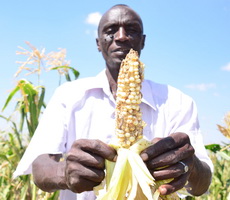
Scientists Recommend Bt Maize as Solution to Fall Armyworm Infestation in Kenya
January 24, 2018| |

A fact-finding mission by an OFAB-Kenya-led team of local journalists to Machakos County revealed that the pest has devastatingly devoured almost the entire maize crops in the county as farmers grapple with the agonising reality. Most farmers have hardly harvested anything from their farms. "My plants have died because of the attack by the fall armyworm and there is hardly anything left in the farm," said Elizabeth Nduku, a smallholder farmer.
Scientists from the Kenya Agricultural and Livestock Research Organisation (KALRO) under the Water Efficient Maize for Africa (WEMA) project have been conducting national field trials to evaluate the performance of Bt maize and provide sustainable solutions against pest invasion and drought in the country.
"In the course of our research, we have demonstrated in regulated experiments at Kitale (Trans Nzoia County) and Kiboko (Makueni County) that Bt maize is not only able to control the stem borer, but also the fall armyworm," said Dr. Murenga Mwimali, a maize breeder at KALRO.
Farmers in Kenya are urging the government to fast track the adoption of genetically modified crops that will see the commercial release of Bt maize eventually marking the end of their woes. "I will not hesitate to accept genetically modified maize if it resists pests and drought," Nduku ardently acknowledged.
For more information, contact Dr. Margaret Karembu at mkarembu@isaaa.org.
| |
Biotech Updates is a weekly newsletter of ISAAA, a not-for-profit organization. It is distributed for free to over 22,000 subscribers worldwide to inform them about the key developments in biosciences, especially in biotechnology. Your support will help us in our mission to feed the world with knowledge. You can help by donating as little as $10.
-
See more articles:
-
News from Around the World
- Nigerian Farmers May Soon Plant Bt Cowpeas
- Scientists Recommend Bt Maize as Solution to Fall Armyworm Infestation in Kenya
- U.S. FDA Approves China's GE Rice
- Study Finds that Hormone Keys Plant Growth or Stress Tolerance, But Not Both
- Plant Biologists Develop Synthetic Auxin to Understand Plant's Mysteries
- Scientists Find "Thermostat" in Plant Immunity
- Wild Rice from Crocodile-Infested Waters in Australia May Help Boost Global Food Security
- Study Reveals More Genes are Active in High-Performance Maize
- EU Court of Justice Advocate General Says Gene Edited Crops Should be Exempted from GM Food Laws
-
Research Highlights
- Apple Protein MdY3IP1 Triggers Early-Flowering and Salt-Tolerance in Arabidopsis
- Scientists Reveal the Role of SlJAZ2 in Tomato
-
Beyond Crop Biotech
- CmHSFA4 Positively Regulates Salt Stress Tolerance in Transgenic Chrysanthemum
-
Announcements
- 5th International Rice Congress
-
Plant
- Optimized CRISPR-Cas9 Induces Targeted Mutation in Kiwifruit
- Researchers Apply CRISPR-Cas9 on Carrot Cells
-
Read the latest: - Biotech Updates (January 21, 2026)
- Gene Editing Supplement (December 17, 2025)
- Gene Drive Supplement (February 22, 2023)
-
Subscribe to BU: - Share
- Tweet
